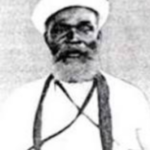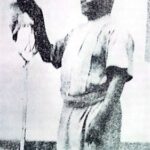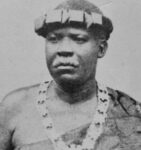MCCORMACK, JOHN
- 6 Min Read
John McCormack (March 24, 1791-March 20, 1865) was one of the few Europeans in the 19th century who spent almost their entire working lives in West Africa. Starting as a timber trader, he acquired a unique knowledge of the Sierra Leone hinterland, and its peoples, especially the Temne. He was later employed as a government agent, playing a vital part in negotiations and treaty-making, and strongly influencing government policy.
He was born in Lurgan, Country Armagh, in Ireland. By the age of about 18 he was already on the West African coast employed as a trading agent, and around 1814 he settled in Sierra Leone where he was to remain almost continuously for 52 years.
McCormack first rose to prominence through the timber trade. In 1816 he shipped the first consignment of African oak from the estuary of the Rokel River to England, the starting signal for the trade, which boomed in Sierra Leone for a brief span of years. He built himself a house on Tombo Island on the Rokel Estuary, complete with wharf and sawpit, where logs received from up the river and from Port Loko further to the north were processed. His lead was followed by other merchants, chiefly European, who settled on neighbouring islands, such as Tasso and Bunce, and started trading in timber.
For as long as it lasted, the timber trade provided an important source of revenue for both the Colony and the Temne, whose country supplied the product. McCormack came into close contact with the Temne, thereby acquiring the first-hand knowledge later to prove so valuable to the Colony. He was also able to prove, against prevailing opinion, that the Temne were willing to work hard if offered incentives.
Initially profitable, the timber trade started to decline after the first few years, and with it McCormack’s wealth. Nevertheless, he persisted, and as supplies dwindled in Port Loko, which they did by 1830, he and other timber traders began to shift their ground. McCormack built a new factory at Gbinti at the mouth of the Melacourie River, in what is now the Republic of Guinea, where he hoped to tap the forest area, and even proposed a canal to the Scarcies. But the prospects were not sufficiently good, and by the 1830s he was ruined.
His creditors, however, allowed him to keep his beautiful house he had built in Freetown, and his knowledge of the interior regions ensured that he continue to play an important part in the affairs of the Colony. The governor, Sir John Jeremie (term of office 1840-41) quickly appointed him as stipendiary police magistrate. He then became an unofficial government agent, negotiating on behalf of the official agent at Port Loko particularly in matters involving trade disputes.
His influence was also enhanced by being patron and teacher to Thomas George Lawson , son of a chief of Little Poqo on the Bight of Benin. Lawson had come to live in McCormack’s household and had accompanied him up country on several visits, where he too acquired the kind of knowledge which led to his appointment in the colonial administration in a key position in charge of interior affairs.
In his role as government agent (which had started while he was still a trader), McCormack was constantly involved in settling disputes in the area of Port Loko and further north and signed various treaties with local rulers on behalf of the government. In 1825 he assisted Governor Sir Charles Turner (term of office 1825-26) in settling a disputed succession to the rulership of Port Loko, the first of several such missions over the next three decades. In 1831, he accompanied the colonial secretary on a mission to mediate in the Temne-Loko wars around Port Loko.
In 1837-38, there was trouble in Koya country east of Freetown, part of which had been ceded to Britain (then called British Koya), while the rest lay outside British jurisdiction. The conflict between Mende in the British section and the Temne owners of Koya country had broken out over farming land. In 1841, McCormack, together with Chief Dalla Modu of Madina in Bullom country, was sent to Koya to settle the disturbance. In 1845, Governor William Fergusson (term of office 1844-45) sent him up the Rokel River to mediate in a protracted war between the Temne and Loko. He succeeded in achieving a temporary peace by 1846.
As he grew older, McCormack’s diplomatic negotiations were increasingly coloured by the religious convictions which he had embraced in later life. By the 1850s he had founded a free-will Baptist Church, a branch of the Church of God, whose congregation met regularly at his house in Freetown. He became deeply concerned about the spread of Islam in the hinterland which he feared was at the expense of Christianity. Where he was able to influence outcomes, he tended to act against the interest of known Muslim families or ethnic groups, and to pursue the interest of the Temne, whom he hoped were more receptive to Christianity.
His bias against Islam is made clear from the part he played in the series of disputes over the succession to the Alikaliship or rulership of Port Loko, largely caused by the attempts of the Sankoh clan to regain leadership after being ousted in the early 19th century. The Sankoh were Muslim Soso with Muslim alliances in the neighbourhood, and had little sympathy with colonial intervention or with the idea of a Christian mission in Port Loko. In 1841, McCormack accompanied Governor John Jeremie to Port Loko, where his views undoubtedly reinforced the governor’s dislike of the Sankoh candidate and led him to prevent a Muslim succession. In 1853, the situation recurred when the Alikaliship was again to be filled, and Major Dillet and McCormack went to Port Loko on behalf of the government to mediate. Again, the decision went against the Sankoh candidate.
In 1860 McCormack went yet again to Port Loko, which had been attacked and burned by Muslim Soso forces and made a treaty with the chiefs of the Bullom shore to the east of Port Loko, reaffirming their supremacy. The following year, now 70 years old, he was sent to look into the Soso-Temne dispute over the rulership of Kambia, on the estuary of the Great Scarcies River. He persuaded the Soso to accept the rule of the Temne candidate, Lamina Barmoi, once again hoping to further Christianity by backing the Temne.
The negotiations in Kambia were McCormack’s last important official service in the hinterland. He had since 1850 been given official recognition for his work through an appointment as “first writer” in the colonial secretary’s office. This position, second to that of the local colonial secretary, was later re-titled assistant colonial secretary.
In 1862, Governor Stephen Hill (term of office 1854-62) appointed him police magistrate in Freetown, but he was too old for it to be more than a sinecure. In 1864 he left for England, where he died on March 20, 1865.
His grandchildren, of African descent on the maternal side, survive in the famous Easmon family of Freetown, which has consistently provided a line of doctors serving in Freetown and elsewhere in West Africa.
C. MAGBAILY FYLE





